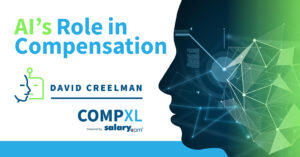
Artificial intelligence (AI) refers to computer systems that can perform tasks typically requiring human intelligence, such as understanding natural language, recognizing patterns, making recommendations, and learning from data. AIs are getting smarter by leaps and bounds. How can compensation pros partner effectively with this new technology? The answer lies in understanding what AI is good at, what it will soon be good at, and where humans will continue to be the best solution.
What’s the difference between AI and good old-fashioned automation?
The obvious thing AI is good at is repetitive work. That’s what automation has always been good at. What AI changes is the ease of automation. AI is, at the least, a good advisor in helping you solve programming or other automation challenges. With the coming advent of AI agents, we can expect automation to get easier and more powerful than ever. Essentially with these new agents, you will be able to explain the automation needed in natural language. There will be no need to code, so anyone with a good understanding of the process and the patience to explain it to an AI agent will be able to create effective automation.
The other difference between AI-driven automation and traditional automation is that AI is smarter. In the past, if we wanted to automate a chatbot to answer routine questions then we would have to think of all the possible questions someone would ask and all the different ways they might ask it. Now, with large language models, the AI can figure out most queries on their own because they already have a good general understanding of language. Some automation projects that were impractical in the past, will be practical with AI because it can figure some things out on its own without us having to specify every detail. For example, a large UK organization attempted to use traditional robotic process automation tools to answer queries from third parties wanting to verify someone’s employment. It proved a more complex problem than it looked at first sight and the expense of automating the process was not worth it. AI makes programming cheaper, in fact, in a case like this HR probably won’t have to hire a consulting company to do the work, the AI tools will allow HR staff to do this kind of automation on their own.
This ease of automation plus some added smarts means comp pros will find it worth the effort to automate a lot more activities than they did in the past. For example, AI tools can automate the tricky tasks of scheduling interviews even when it involves multiple interviewers and multiple locations. Some of the capabilities of AI are still a bit immature, and agents are brand-new so there are still some rough spots. However, those rough spots will be touched up by vendors, so don’t let today’s hiccups blind you to what we can expect to see a year from now. We can expect AI will get much better at catching its own mistakes, keeping up to date with new information, and clarifying what it is doing so that HR can be assured it’s handling things appropriately.
Beyond a few years, no one knows what AI will be capable of, any more than we understood the full implications of the internet in 1999.
What’s the difference between AI and a good old-fashioned human?
One underappreciated part of being a compensation pro is the need for good judgment. Some people think that compensation is so numbers-based and so rules-based that it’s an area free from judgment. Experienced pros know that is far from true.
The reason judgment is so important is that the field is both complex and emotional. There are always situations that don’t fit the rule book; there are always cases where making difficult tradeoffs is necessary. In the AI world, these are referred to as “edge cases”; and in compensation, there are a lot of them.
If you have been involved in compensation planning then you know a lot of judgment is required. That judgment is best made by someone close to the situation who understands the nuances. An ivory tower or algorithmic approach won’t lead to wise decisions.
The key to managing the edge cases is an understanding of the business and its competing priorities, familiarity with what was done in similar cases in the past, and an appreciation of the people involved, their issues, and their motivations. This is where experienced humans excel and where AI will fall short.
Implications
Compensation pros should go all in on the automation possibilities enabled by AI. This is the future and diving in is the right thing to do for the organization and the compensation pro who wants to remain relevant.
At the same time, compensation pros should start paying closer attention to what those edge cases are and be careful not to ask the AI to take on decisions it just can’t make. Cherish your ability to develop a nuanced understanding of the situation. It is your ability to make sound judgments in difficult situations where you add the most value.
CompensationXL is the flexible compensation planning solution for merit, bonus, long-term awards, and total reward statements, enabling mid- to large-size organizations to implement competitive pay structures such as vested stock options and variable incentive pay.
www.compensationxl.com . sales@compensationxl.com . Dial: 866-376-7769
